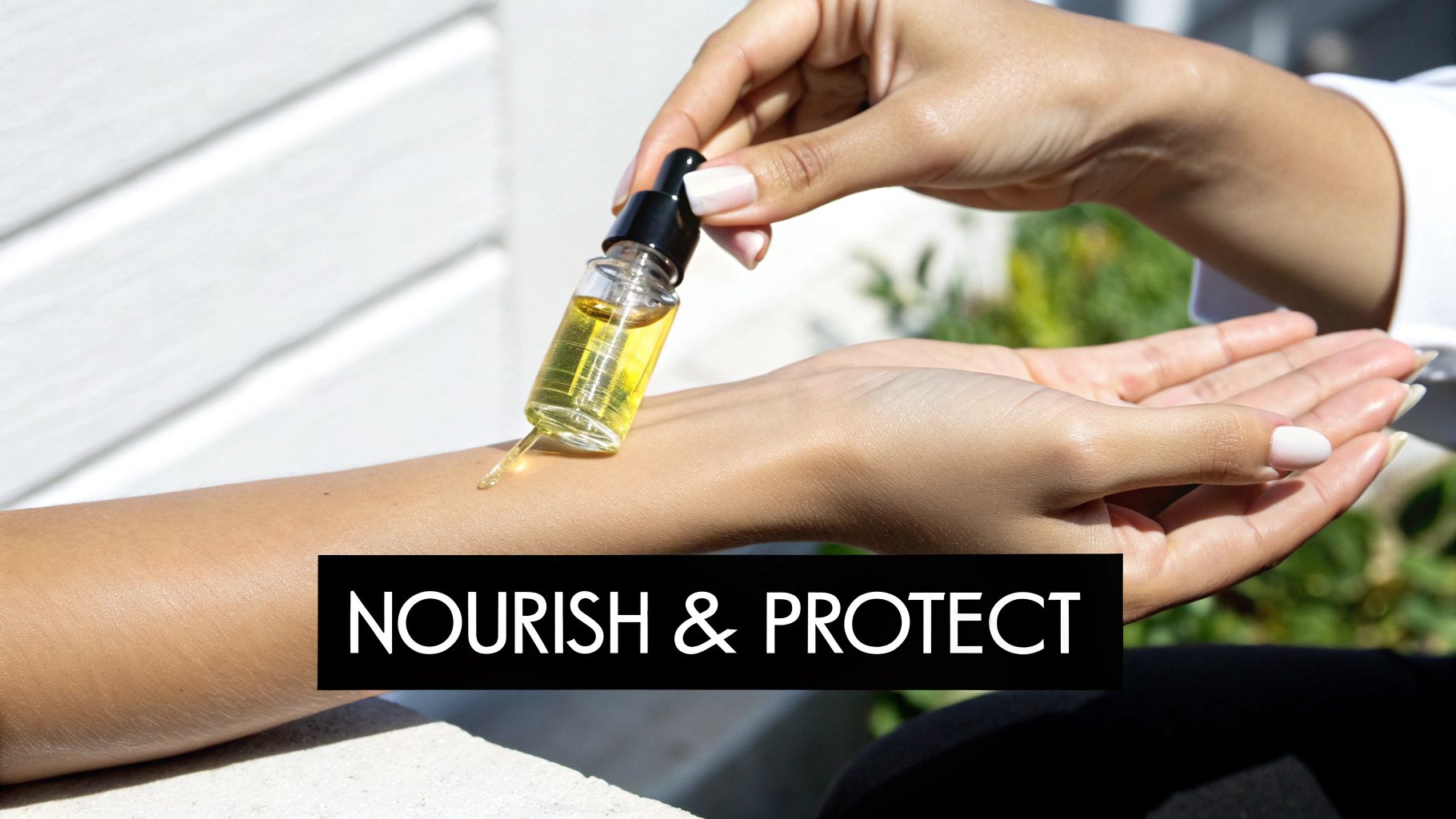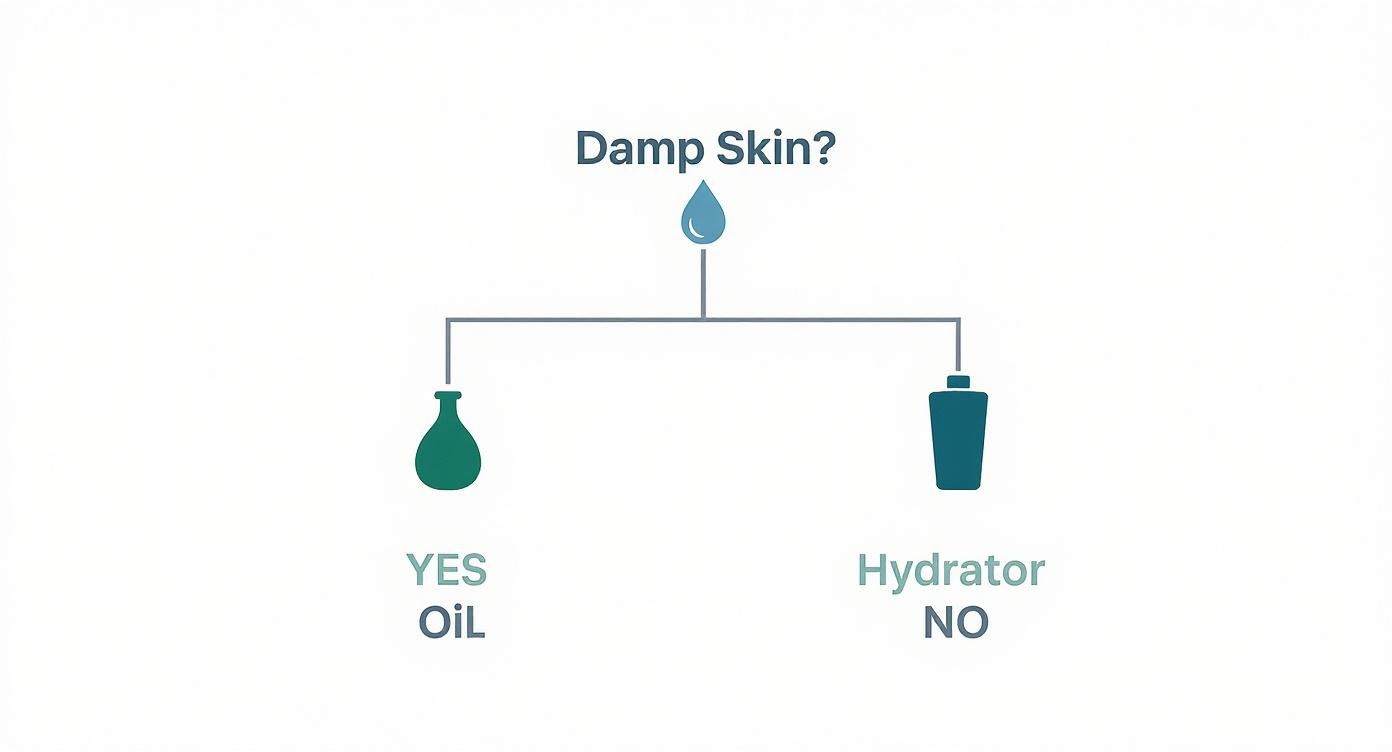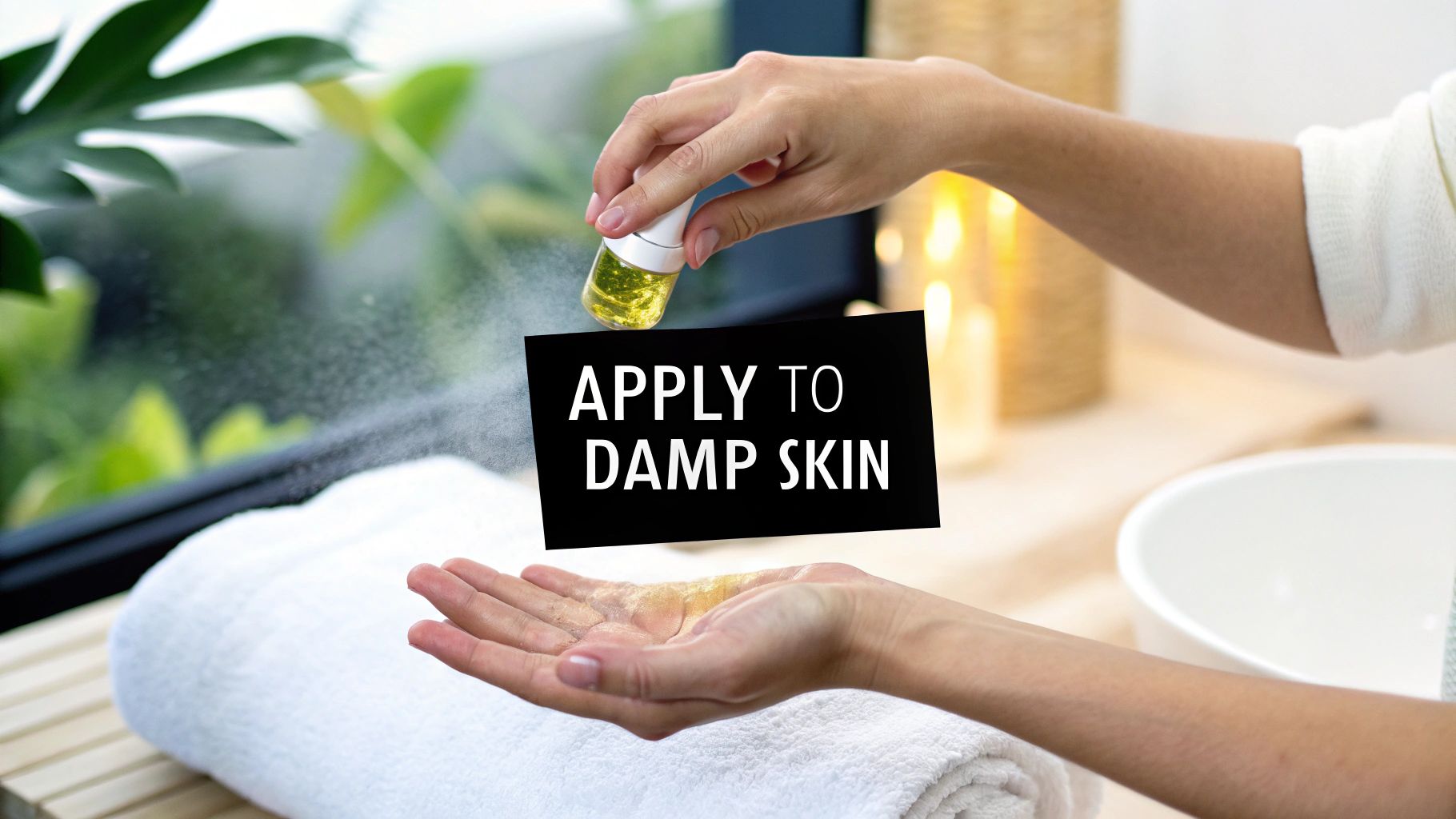Jan Elvis
23.11.2025

Jan Elvis
23.11.2025
At their core, body oils are all about two things: deep moisturization and skin barrier support. Unlike water-based lotions, quality oils are packed with lipids that are incredibly similar to your skin's own natural oils. This allows them to create a protective seal that locks in moisture, stops dryness in its tracks, and delivers the nutrients your skin needs to look and feel its best.

Let’s get straight to it. Body oil isn't just some fancy, extra step—it's a foundational tool for genuinely healthy skin. A lot of guys think oils are only for people with cracked, desert-dry skin, but that's a huge misconception.
The real magic of a body oil is its ability to sync up with your skin's natural lipid barrier.
Think of your skin's top layer like a brick wall. Your skin cells are the "bricks," and the natural fats and oils are the "mortar" holding it all together. When that mortar is strong, moisture stays locked in, and all the bad stuff (like irritants and pollution) stays out. A good body oil essentially acts like fresh mortar, reinforcing that wall for everyone, not just guys with obviously dry patches.
When you strengthen that barrier, you get some real, science-backed results that will seriously upgrade your grooming game. The main advantages of using body oil are:
It's no surprise that more people are catching on. The global body oil market was valued at $2.76 billion in 2021 and is on a steady climb, all because guys are looking for natural products that actually work.
Body oil isn’t just about making your skin feel slick for an hour. It’s about making your skin better at holding its own moisture for long-term health and a natural, healthy sheen.
As you start looking at different oils, it pays to know what's inside the bottle. For example, learning about the top olive oil benefits for skin can show you just how powerful a single, high-quality ingredient can be. That same idea applies to any oil you choose—the ingredients are what make all the difference.
Alright, let's break down how body oils actually work to get your skin feeling its best. It’s not as complicated as it sounds, but it’s a game-changer once you get it.
First, you have to know the difference between hydration and moisturization. Think of it this way: hydration is drinking a glass of water, and moisturization is putting a lid on that glass so it doesn't evaporate. One adds water, the other locks it in.
Body oils are the undisputed champions of locking it in. They don’t add water to your skin, but they’re brilliant at stopping the water you already have from escaping.
Imagine your skin’s outer layer is like a brick wall. The skin cells are the bricks, and the natural oils and fats your body produces are the mortar holding it all together. When that mortar is solid, your skin has a strong barrier that keeps moisture in and all the bad stuff—like irritants and pollution—out.
But life happens. Hot showers, harsh soaps, even just dry air can start to break down that mortar, leaving little cracks in your skin’s defenses. This is where a good body oil comes in.
When you smooth on a body oil, you’re basically patching up that mortar. The oil sinks in and fills those tiny gaps between your skin cells, creating a protective seal over the surface.
This seal is a big deal because it slows down something called Transepidermal Water Loss (TEWL). That’s just the technical term for the process of water naturally evaporating off your skin. By forming a barrier, the oil keeps that precious water right where it belongs: in your skin. The result is skin that feels softer, looks smoother, and is way more comfortable.
Think of body oil as a top-notch security guard for your skin's moisture. It doesn't just slap on a temporary fix; it helps your skin get better at holding onto its own hydration all day long.
Strengthening your skin barrier does more than just make it feel good. It makes your skin tougher and more resilient, better able to stand up to environmental stress from wind, pollution, or dry office air conditioning.
This isn't just theory; the proof is there. A recent study showed that people using body oils with natural ingredients like argan, jojoba, and almond oil saw a 35% increase in skin hydration in just four weeks. Pretty impressive, right?
On top of that, a massive 78% reported their skin texture felt better and that dryness was noticeably reduced. It just goes to show how powerful this one simple step can be. You can dig into more of the details in this body oil market analysis on market.us.
At the end of the day, it all boils down to a simple idea. By locking in moisture, body oils help your skin maintain its own natural balance, giving you that healthy, deep-down glow that a lot of lotions just can't quite replicate.
Let's be real: not all oils are created equal. Standing in the grooming aisle can feel like a pop quiz you didn't study for, but figuring out which body oil to grab is simpler than it looks. The secret is knowing a few key ingredients that actually work, so you end up with healthy skin, not a greasy mess.
Think of it this way: you wouldn't put diesel in a gasoline engine. The right ingredients are the high-performance fuel your skin needs to look and feel its best.
The best oils are the ones your skin already recognizes. Some plant-based oils have a molecular structure that's a near-perfect match for the natural oils (sebum) your body produces. This means they sink in fast to moisturize and strengthen your skin barrier without just sitting on the surface or clogging your pores.
Keep an eye out for these power players:
The best body oils don't just put a coating on your skin; they sync up with its natural rhythm. Jojoba and squalane are so effective because they work with your body's own system, not against it.
This whole process comes down to a simple choice, especially right after a shower.

As the chart shows, body oils are designed to be applied to damp skin. That’s the key to locking in all that water and getting a hydrated, healthy glow.
To make things even clearer, let's break down which oils work best for different skin situations.
| Ingredient | Key Benefit | Best For Skin Type |
|---|---|---|
| Jojoba Oil | Mimics skin's natural sebum, balancing oil production. | Normal, Oily, Combination, Acne-Prone |
| Squalane | Ultra-lightweight hydration, non-comedogenic. | All Skin Types, especially Oily & Sensitive |
| Argan Oil | Deeply nourishing with vitamin E, improves elasticity. | Normal, Dry, Mature |
| Avocado Oil | Rich in fatty acids, intensely moisturizing. | Very Dry, Mature, Eczema-Prone |
| Grapeseed Oil | Lightweight, high in antioxidants, easily absorbed. | Normal, Oily, Acne-Prone |
This table is a great starting point, but always listen to what your own skin is telling you.
Just as there are heroes, there are some ingredients that can be villains for certain skin types. Knowing what your skin needs is half the battle. If you're not sure, our guide on how you can tell your skin type is a great place to start.
Be a little wary of these:
Ultimately, picking the right oil is about matching its strengths to your skin's needs. Once you get the hang of reading the ingredient list, you can confidently choose a product that will leave you with that healthy, non-greasy glow.
Walking down the moisturizer aisle can feel like a guessing game. You've got body oils and lotions, and both claim to give you smoother, healthier skin. The thing is, they work in completely different ways, and knowing that difference is key to picking the right one for you.
Here’s a simple way to think about it. Lotions, which are a mix of oil and water, are like giving your skin a quick drink. They deliver a direct hit of hydration (the water part) to quench thirsty skin.
Body oil is different. It’s like putting a lid on that glass of water to stop it from evaporating. Oils are purely occlusive—they don't add new water, but they are absolute champs at sealing in the moisture your skin already has, especially right after a shower.
Lotions are usually the first thing people grab for a quick moisture boost. Their water content makes them absorb fast, giving you immediate relief when your skin feels tight. The downside? That relief can be short-lived because the water can evaporate, leaving your skin thirsty again.
Body oils play a different game. They are all about moisturization, which just means locking in hydration. By forming a protective layer on your skin, oils seriously cut down on something called transepidermal water loss (TEWL). That’s just a fancy term for water escaping from your skin. Less escape means your skin stays hydrated way longer.
Lotions give your skin a quick drink. Oils make sure your skin holds onto that moisture all day. One delivers hydration; the other protects it.
So, is it an either/or situation? Not at all. For guys with seriously dry, flaky, or dehydrated skin, using both is a total game-changer. Layering them gives your skin the ultimate one-two punch of hydration and long-lasting moisture.
Here’s how to do it right for the best body oil benefits:
This combo delivers a level of deep, lasting moisture that neither product can pull off alone. Your skin will feel incredibly soft, nourished, and ready for whatever the day throws at you.

Getting the most out of your body oil isn't about slathering it on—it’s all in the technique. The right approach makes a huge difference, turning a good product into an essential part of your routine and giving you that healthy glow without feeling like a greaseball.
The number one rule? Apply body oil to damp skin. This is non-negotiable. Think of it like this: oil doesn't add moisture, it seals it in. By applying it right after a shower while your skin is still a little damp, you’re trapping that water against your skin, locking in serious hydration that lasts.
Nailing a smooth, non-greasy finish is easier than you think. Just follow these steps to turn a simple task into a quick, effective self-care ritual.
The goal is to work with your skin, not against it. Hitting damp, warm skin right after a shower creates the perfect storm for deep, lasting hydration, leaving it feeling soft and strong.
This simple method is a game-changer for any grooming routine. To see how it fits with everything else you’re using, check out our guide on the proper skin care order of application.
Think of body oil as more than just another bottle on your shelf. It's one of the most versatile players you can add to your grooming lineup. Just calling it a "moisturizer" really sells it short. It’s a multi-tasking product that can actually simplify your routine while delivering some serious skin benefits, making you feel more comfortable and confident.
One of its best, and often overlooked, uses is calming your skin right after a shave. A few drops massaged into your neck, face, or anywhere else you use a razor can immediately cut down on redness and irritation. It leaves your skin feeling smooth and helps it bounce back from the stress of the blade.
Working body oil into your day is all about making small upgrades to your existing habits. It's a simple move that creates a noticeable difference in how your skin looks and feels, whether you're winding down after work or getting ready for a night out.
Here are a few easy ways to make it work for you:
The goal is to find what feels right for you. Our full guide has even more grooming tips for men to help you build a routine that feels like second nature.
The real power of body oil is how many jobs it can do. It’s a post-shave soother, a massage oil, a bath additive, and a beard conditioner all in one. One bottle, multiple problems solved.
Nobody wants to feel greasy—that’s a common worry. But it’s also completely avoidable. The trick is to always apply oil to damp skin, which helps it absorb almost instantly. Also, look for lightweight formulas with ingredients like jojoba or squalane. This way, you get a healthy, subtle sheen, not an oil slick.
Here’s another pro tip: using an unscented or lightly scented body oil can actually make your cologne stick around longer. Why? Because hydrated skin holds onto fragrance way better than dry skin. If you want your signature scent to last all day, applying body oil first is a game-changer. You can find more tips for making perfume last longer to really master your scent.
By making body oil a regular thing, you’re doing more than just moisturizing—you’re leveling up your whole approach to taking care of yourself.
Alright, so you're sold on the benefits, but a few questions might still be lingering. That's totally normal. Let's tackle some of the most common hangups so you can feel 100% confident when you add body oil to your grooming kit.
This is probably the number one concern, especially for guys who deal with breakouts on their back or chest ("bacne" is a real thing). The quick answer? Not if you use the right stuff. The days of heavy, greasy oils that clog everything up are long gone.
The key is to look for oils that are non-comedogenic—a fancy word that just means they won’t clog your pores. Think lightweight power players like jojoba, squalane, and grapeseed oil. These are brilliant because they actually mimic your skin's natural oils, helping to keep things in balance instead of causing a traffic jam in your pores. If you're acne-prone, just play it safe and test it on a small spot first.
Tempting, but it's usually best to keep your body and face products separate. The skin on your face is a whole different ballgame—it's thinner and way more sensitive. Many body oils are just too heavy for it and could lead to clogged pores or irritation.
The one exception? If you have a body oil that's 100% pure, non-comedogenic oil—like straight-up argan or jojoba oil with nothing else in it—you can probably get away with using a tiny bit on your face. Just make sure there are no added fragrances or other ingredients that could cause trouble. When in doubt, stick to a dedicated face moisturizer.
To really see and feel a difference, try to make it a daily thing. The perfect time is right after you hop out of the shower. Pat yourself mostly dry, but leave your skin a little damp—this helps the oil lock in all that moisture.
Think of it like watering a plant. A little bit of water every day is far more effective than a huge amount once a week. Daily application keeps your skin consistently hydrated and resilient.
Consistency is what builds and maintains a healthy skin barrier. But hey, life happens. Even if you only get around to it a few times a week, your skin will still thank you. The main rule is to just listen to your body. If your skin feels tight, dry, or ashy, that’s its way of telling you it's thirsty.
Ready to feel the difference for yourself? The Main Character collection is built to give your skin the good stuff, without any of that greasy, heavy feeling. Explore our products today and build a routine that puts you first.